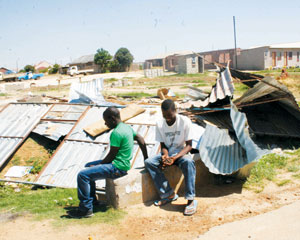
DEMOLITIONS of illegal structures by government have been stalled after some Zanu PF MPs complained that the move would make the party unpopular with the electorate, especially soon after being elected into power.
BY CAIPHAS CHIMHETE
They warned that people do not have short memories.
Before the July 31 elections, Zanu PF MPs encouraged people to illegally construct houses in exchange for votes.
And indeed the party, though controversially, won with over two-thirds parliamentary majority but its electoral promises have come back to haunt them.
Local Government, Public Works and National Housing minister, Ignatius Chombo recently warned that all illegal structures would be demolished in an exercise similar to Operation Murambatsvina that left about 700 000 people homeless.
But some MPs warned that the demolitions would affect Zanu PF’s performance in the 2018 elections. The party is already preparing to make sure that the MDC-T, which won parliamentary dominance in 2008, is completely dislodged from the national political platform.
“We are saying if the structures are destroyed how would we go back to the same people to campaign?” said one MP. “It has been the party’s strategy to parcel out land to our supporters in and around towns to neutralise the MDC-T.”
- Chamisa under fire over US$120K donation
- Mavhunga puts DeMbare into Chibuku quarterfinals
- Pension funds bet on Cabora Bassa oilfields
- Councils defy govt fire tender directive
Keep Reading
Another MP said Chombo should find ways to formalise the illegal settlements to keep the beneficiaries as “captive voters” in the next elections.
Several slums with links to Zanu PF officials have emerged in and around Harare, Ruwa, Seke and Chitungwiza in the past decade.
Last week, Harare Metropolitan Province minister, Miriam Chikukwa and Deputy Local Government Minister Biggie Matiza contradicted each other on the issue of demolitions.
Chikukwa proposed a non-confrontational approach to avoid antagonising the people, while Matiza insisted that houses on wetlands, sewer mains and under electricity cables must go.
Failure by Zanu PF officials to speak with one voice, analysts said, was clear indication that the party was in a dilemma on how to handle the matter.
Zanu PF spokesperson, Rugare Gumbo however, professed ignorance over discord in the party over the demolitions.
He said the party did not support haphazard construction of houses.
Rugare said the issue of demolitions was Chombo’s baby.
“If there are differences, we will solve them internally and come up with an agreed and united position,” said Rugare adding, “most of the illegal structures are a result to the MDC-T officials who were trying to ‘empower’ their people.”
The MDC-T, which controlled most urban local authorities around the country, was accused of corruption during its tenure in the inclusive government.
The party has however, condemned demolitions, which saw several houses and tuckshops, demolished in Ruwa last week.
“The party strongly condemns this callous move by the controversially elected Zanu PF government, especially during the rainy season,” said the party in a statement.” Sadly, this happens at a time when over 40% of the adult population has no personal residential properties, while tuckshops have become the only source of income for most residents who have no jobs.”
The party said now that the elections are over, Chombo, “who is responsible for the crisis as he personally issued out residential stands on undesignated council land for political mileage, wants to dash the people’s hopes of owning properties”.
The MDC-T said the government’s action violated the people’s right to shelter.
The Zimbabwe Lawyers for Human Rights (ZLHR) has also added its voice condemning the demolitions.
In a letter delivered to Chombo last week, ZLHR demanded assurances that they would follow the dictates of the law in executing the planned evictions and demolition of property, given the fact that Zimbabwe has entered a new constitutional dispensation, which provides for the protection of the basic human rights of the people.
It said Chombo must comply with the provisions of Section 74 of the new Constitution which states that: “No person may be evicted from their home, or have their home demolished, without an order of court made after considering all the relevant circumstances.”
The lawyers also demanded that Chombo’s ministry furnishes them with the total number of households that will be affected. In particular, how many children will be left without shelter and the duration of the notice period given to the affected families and persons and in what form shall the notice be.
Section 28 of the Constitution states that: “The State and all institutions and agencies of government at every level must take reasonable legislative and other measures, within the limits of the resources available to them, to enable every person to have access to adequate shelter”.
The lawyers gave Chombo 72 hours “to furnish the required particulars, failing which ZLHR will take appropriate legal action against the minister and some responsible authorities.”
Chombo could not be reached for comment last week. ‘PEOPLE SHOULD NOT BUILD NEW STRUCTURES’
In Chitungwiza, Zanu PF supporters staged a demonstration against the demolition of illegal structures in the town and even threatened legal action against the party.
Local Government minister Ignatius Chombo has said the government would destroy all illegal structures and that people should not build new structures.
Chombo has since appointed a task team led by his deputy, Joel Biggie Matiza to investigate cases of unlawful parcelling out of land by Manyame Rural District council and Chitungwiza Municipality.
The team will also seek to verify how people illegally acquired land.
The on-going evictions and demolitions which evoke memories of June 2005 Operation Murambatsvina which left over 700 000 people homeless, while several thousands of children failed to attend school.











